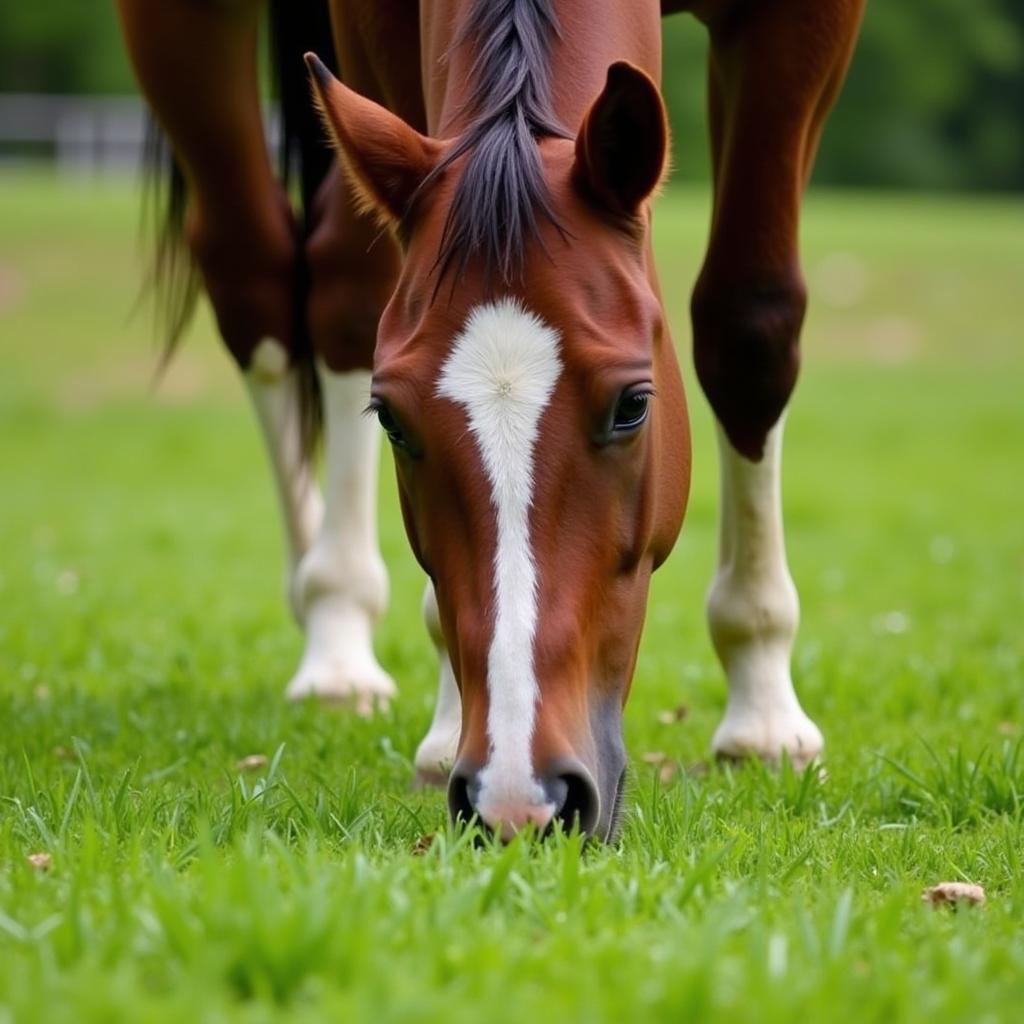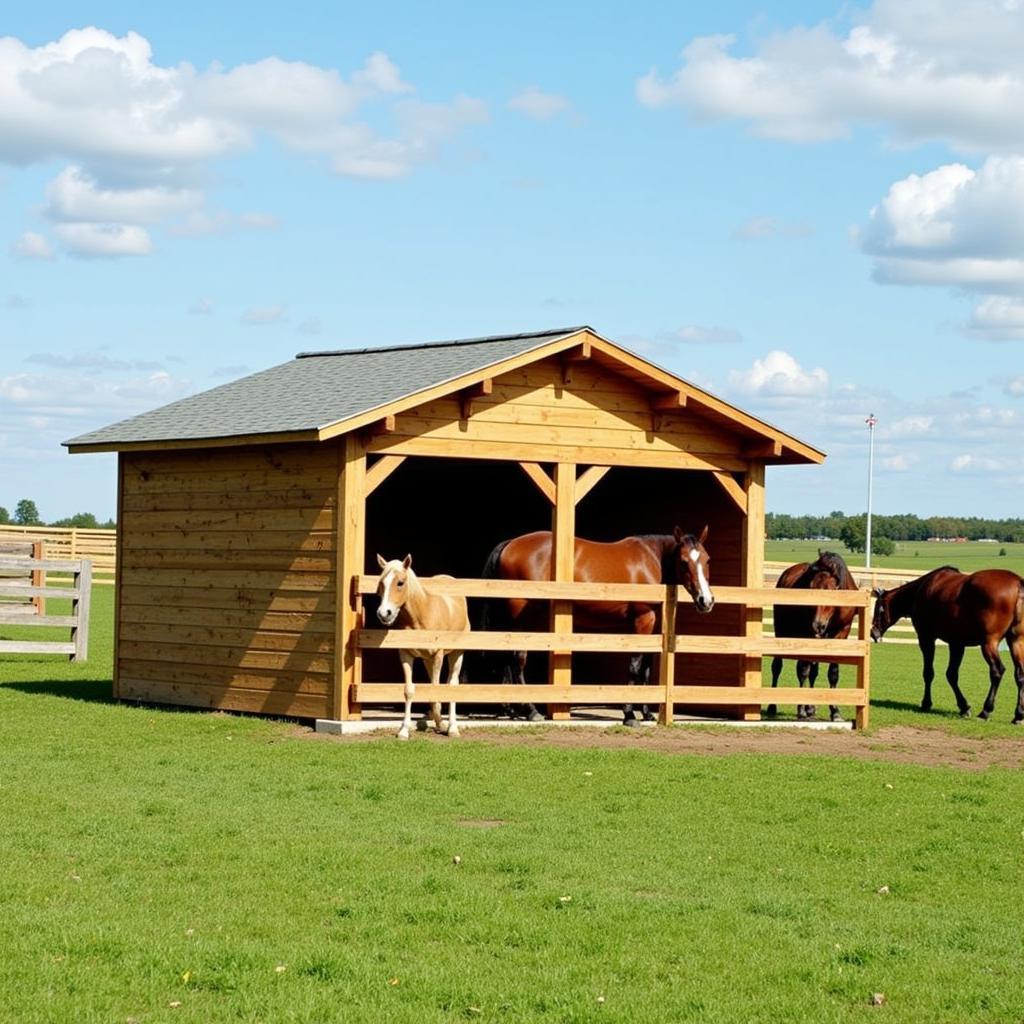Owning a horse is a dream for many, but understanding the land requirements is crucial. How Many Acres To Have A Horse depends on several factors, including your horse’s breed, grazing habits, and your management practices. Let’s delve into the specifics to help you determine the ideal acreage for your equine companion.
Factors Influencing Acreage Needs
Several key factors influence how much land you need for a horse. Ignoring these can lead to overgrazing, environmental damage, and a decline in your horse’s health.
Horse Breed and Size
Larger breeds like draft horses naturally require more forage than smaller breeds like ponies. A miniature horse might thrive on a smaller pasture, while a Clydesdale will need significantly more space.
Grazing Habits and Forage Availability
Some horses are more efficient grazers than others. If your pasture is lush and productive, you might need less acreage. Conversely, poor quality pasture will require more land to provide sufficient forage.
Management Practices: Rotational Grazing and Supplemental Feeding
Implementing rotational grazing, where you divide your pasture into smaller paddocks and rotate your horses through them, can significantly reduce the acreage needed. Supplemental feeding with hay and grain also decreases the reliance on pasture grazing.
 Horse Grazing in a Pasture: Determining the Right Acreage
Horse Grazing in a Pasture: Determining the Right Acreage
Calculating Acreage: A General Guideline
While there’s no one-size-fits-all answer, a general rule of thumb is 1.5 to 2 acres per horse. This assumes a reasonably productive pasture and some supplemental feeding. However, this is a starting point, and your specific needs may vary. For example, arid regions might require significantly more acreage per horse due to limited forage growth.
What About Multiple Horses?
If you plan on keeping multiple horses, you’ll need to increase the acreage accordingly. Simply multiplying the acreage per horse by the number of horses isn’t always sufficient. Consider the dynamics of the herd and potential competition for resources.
Beyond Grazing: Other Land Considerations
Don’t forget to factor in space for shelters, storage, and other facilities. A run-in shed provides essential protection from the elements, while a hay barn is necessary for storing feed. If you plan to ride on your property, you’ll also need to consider space for an arena or riding trails. You might be interested in horse property for sale in tucson az.
Soil Quality and Drainage
Healthy pasture requires good soil quality and proper drainage. Poorly drained soil can lead to muddy conditions, which can contribute to hoof problems and other health issues.
Expert Insights
“Proper pasture management is just as important as acreage,” says equine nutritionist Dr. Sarah Mitchell. “Even with ample land, overgrazing can quickly deplete the pasture and negatively impact your horse’s health.”
Local Regulations
Check your local zoning regulations and ordinances regarding livestock. Some areas have specific requirements for horse ownership, including minimum acreage and fencing regulations. Perhaps you’d like to browse some horse ranch names.
 Horse Shelter in a Pasture: Planning for Acreage and Facilities
Horse Shelter in a Pasture: Planning for Acreage and Facilities
Conclusion
Determining how many acres to have a horse is a crucial step in responsible horse ownership. By carefully considering your horse’s individual needs, your management practices, and your local environment, you can create a healthy and thriving environment for your equine companion. Looking for horse riding lessons massachusetts?
FAQ
- Can a horse live on one acre? While possible with intensive management and supplemental feeding, it’s generally not recommended.
- What is rotational grazing? Dividing your pasture into smaller sections and rotating your horses through them to prevent overgrazing.
- How do I improve my pasture quality? Soil testing, fertilization, and weed control are key strategies.
- Do I need a shelter for my horse? Yes, a shelter provides protection from the elements and is essential for horse welfare.
- Are there zoning regulations for horse ownership? Yes, check with your local authorities for specific regulations in your area. You could be interested in aiken horse farms for sale.
- What are the signs of overgrazing? Sparse vegetation, bare patches, and weed infestation.
- How often should I rotate my pastures? The frequency depends on factors such as pasture growth rate and the number of horses. Consult with a local equine extension agent for guidance. Perhaps horse property for sale st johns county fl might interest you.
Need help with horse care or finding the perfect property? Contact us! Phone: 0772127271, Email: [email protected] or visit us at QGM2+WX2, Vị Trung, Vị Thuỷ, Hậu Giang, Việt Nam. We have a 24/7 customer service team.